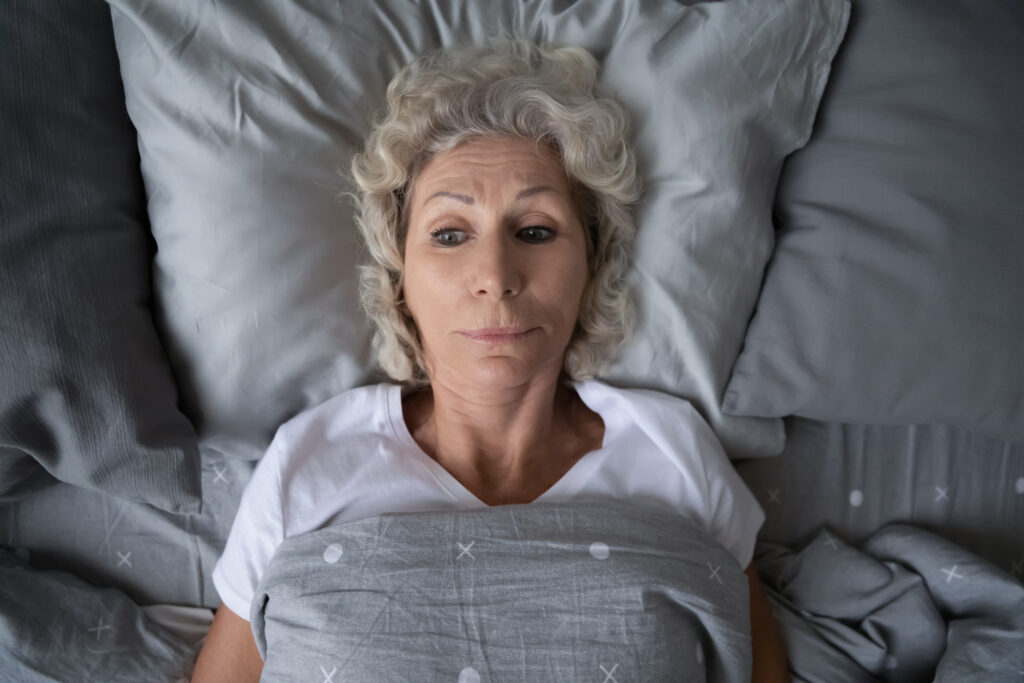April 4, 2023
Common Causes and Ways to Treat Insomnia for Older Adults
Many people find that, as they grow older, sleep becomes a challenge. The Sleep Foundation estimates that 10 to 30% of adults struggle with insomnia, and people over 60 may be more prone to sleep problems. According to a 2018 study, as many as 50% of older adults report problems sleeping.
Insomnia can take several forms, such as difficulty falling asleep, difficulty staying asleep, and difficulty going back to sleep after waking up at night. Older adults may experience changes to sleep patterns due to decreased physical activity, changes in general health, or as a side effect of medications. Whatever the cause, insomnia can leave you tired and frustrated that you lack the energy for your favorite activities. Lack of restful sleep can also worsen other health conditions and affect mental health.
Causes of Insomnia
Insomnia has many causes. You may have several factors that contribute to sleeplessness. Five common causes of sleep problems in older adults include:
- Sleep apnea: Sleep apnea is a relatively common condition where breathing stops and starts while you sleep. Sleep apnea is a common cause of snoring but can also result in restless legs, excessive waking at night, and a general lack of quality sleep. Sleep apnea is more common in older adults, and men are more likely than women to develop sleep apnea.

- Chronic health conditions: Many health conditions associated with age can have sleep disturbance as a side effect. Alzheimer’s, diabetes, heart disease, respiratory disorders, and conditions that cause chronic pain can all interfere with sleep.
- Mental health conditions: Conditions that affect mental health can lead to sleep problems. People who have experienced PTSD often report insomnia. Anxiety can be a cause of disrupted sleep as well. Depression can lead to awakening too early and being unable to go back to sleep.
- Medications: Medications that seniors may be taking to manage other health conditions can lead to sleep issues as a side effect. Medications to control blood pressure or asthma may interrupt sleep. Some antidepressants can affect sleep as well. Certain over-the-counter medications, such as decongestants, have a stimulant effect, which may affect sleep.
- Lifestyle factors: Substances such as caffeine and nicotine can keep you awake, particularly if you indulge too close to bedtime. Some people find that alcohol can negatively affect the quality of their sleep. A diet that causes digestive issues or heartburn may result in sleepless nights due to discomfort. Lack of physical activity can also result in wakefulness or restlessness.
Managing Insomnia
You can talk to your doctor about your sleep patterns and ask for ways to treat insomnia for older adults. Your doctor may suggest you start with simple changes, like reducing the use of caffeine or alcohol late in the day. They may also suggest a moderate exercise routine to help you feel more tired. Changes in diet may reduce the risk of heartburn or other digestive discomforts that keep you up at night.
 Your doctor may suggest a sleep study if lifestyle changes don’t resolve sleep problems. These can be done at home or in a sleep lab, depending on the type of study. Your doctor will measure your vital signs and sleep patterns to determine if sleep apnea or another issue affects your sleep. If you are diagnosed with sleep apnea, you may benefit from a CPAP machine to help you get oxygen overnight or a dental appliance that prevents physical obstruction to your airway.
Your doctor may suggest a sleep study if lifestyle changes don’t resolve sleep problems. These can be done at home or in a sleep lab, depending on the type of study. Your doctor will measure your vital signs and sleep patterns to determine if sleep apnea or another issue affects your sleep. If you are diagnosed with sleep apnea, you may benefit from a CPAP machine to help you get oxygen overnight or a dental appliance that prevents physical obstruction to your airway.
If the cause of your sleep problems is related to your health or medications, your doctor may be able to adjust your treatment regimen to allow for better sleep. If you can’t change medications, they may prescribe a sleep aid to help you get good rest while continuing to manage your health.
No matter your age, you don’t have to live with chronic sleep issues. Your doctor can help you find the cause of your sleep problems and ways to treat insomnia for older adults so you have the energy for daily life.
References:
“Insomnia and Older Adults.” The Sleep Foundation. March 3, 2023. https://www.sleepfoundation.org/insomnia/older-adults.
Brewster GS, Riegel B, Gehrman PR. Insomnia in the Older Adult. Sleep Med Clin. 2018 Mar;13(1):13-19. Epub 2017 Nov 22. PMID: 29412980; PMCID: PMC5847293. doi: 10.1016/j.jsmc.2017.09.002.
“SLEEP APNEA Causes and Risk Factors.” National Heart. Lung, and Blood Institute. March 24, 2022. https://www.nhlbi.nih.gov/health/sleep-apnea/causes.
“What to Know About Insomnia as You Age.” WebMD. March 18, 2021. https://www.webmd.com/healthy-aging/insomnia-in-elderly.
“Insomnia.” Mayo Clinic. https://www.mayoclinic.org/diseases-conditions/insomnia/symptoms-causes/syc-20355167.
DISCLAIMER
The information featured in this site is general in nature. The site provides health information designed to complement your personal health management. It does not provide medical advice or health services and is not meant to replace professional advice or imply coverage of specific clinical services or products. The inclusion of links to other web sites does not imply any endorsement of the material on such websites.